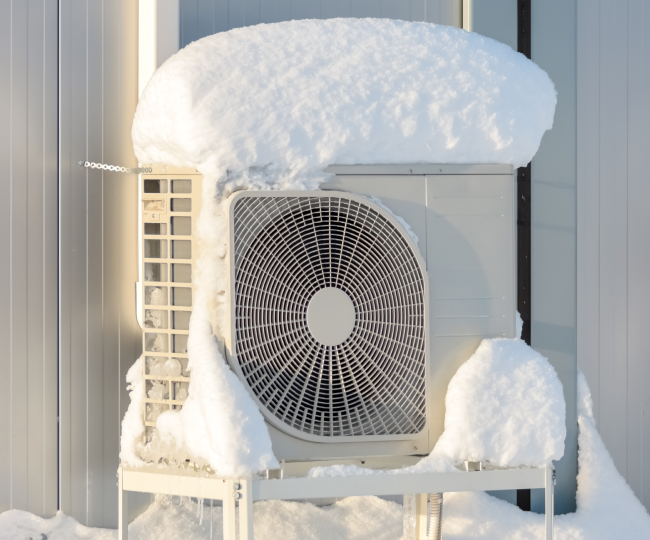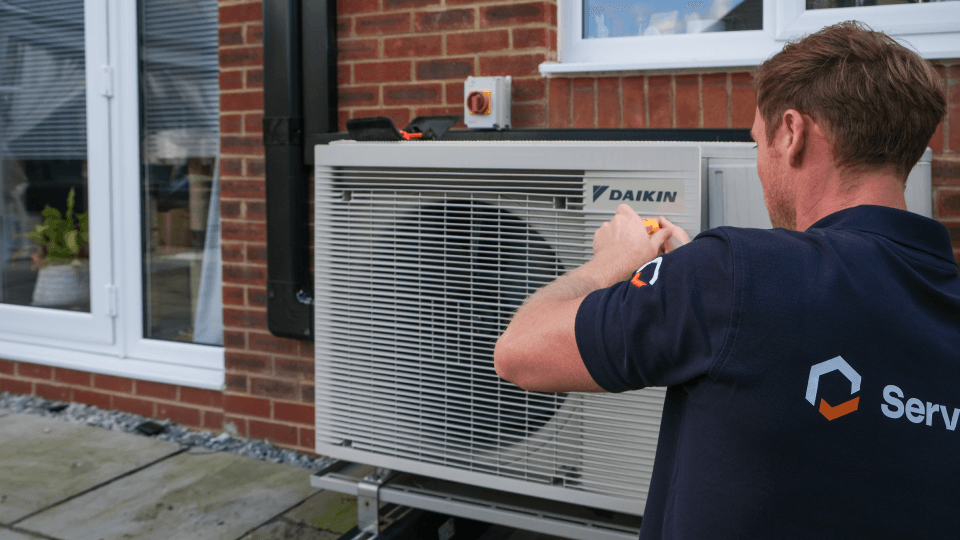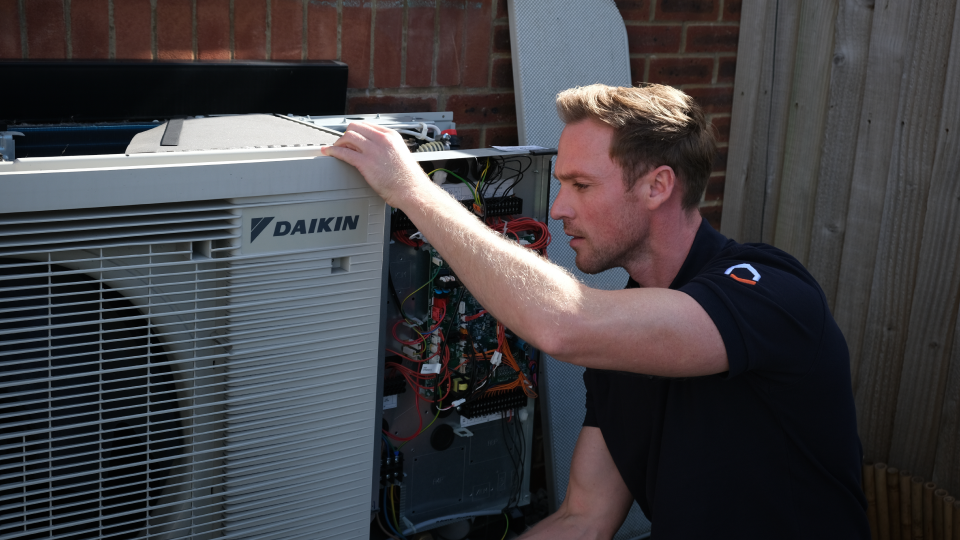Air Source Heat Pumps are an increasingly popular, sustainable and economical way of heating homes in the UK – but as with any system, they experience the occasional blip, especially if the unit isn’t set up or serviced properly.
When heat pumps go wrong, it’s usually because of a few common reasons. Troubleshooting these problems will help you keep bills down and get the heat pump up and running quickly.

The most common issues with Air Source Heat Pumps
This is one of the most common complaints, where your system is running but takes an age to reach the desired temperature.
Lack of heat or low performance
This is one of the most common complaints, where your system is running but takes an age to reach the desired temperature.
Common causes include:
- Dirty or blocked air filters
- Low refrigerant levels
- Thermostat or control issues
- Poor airflow due to blocked vents or ducting
- An undersized system or poor insulation
What to look out for:
- Rooms that feel cooler than usual
- Your system is running constantly or switching off too quickly (short cycling)
- Energy bills are creeping up for no reason
What to do:
- Check and clean the air filters
- Make sure your thermostat is set correctly and hasn’t lost connection
- Clear any obstructions from the vents or the outdoor unit
- If problems persist, call a qualified technician – low refrigerant or flow rate issues need urgent professional attention
Icing on the outdoor unit
Frost on your outdoor unit during winter is quite normal and can be handled by the heat pump, but if the unit has a heavy ice build-up or is frozen over, something’s not working properly.
What causes excess icing?
- Poor airflow around the unit
- Blocked or dirty coils
- Low refrigerant levels
- A malfunctioning defrost cycle
- Obstructed or snow-covered vents
Why it matters:
- Ice build-up restricts airflow, reducing its efficiency
- Your system may stop heating altogether
- Long-term strain can damage components
What to look out for:
- Keep the area around the outdoor unit clear of obstructions
- Don’t try to chip off the ice – this could cause more damage
- Gently clear loose snow or frost with warm water or airflow
- If the problem persists, get the system checked by a professional, especially the defrost cycle and refrigerant charge
Strange or excessive noise
If your air source heat pump starts making odd or excessive noises, get it investigated. Buzzing, rattling, hissing, or grinding sounds usually mean something’s loose, worn out, or not running as it should.
Common causes include:
- Loose panels or components
- Debris in the fan or outdoor unit
- Worn bearings or motor issues
- Fan imbalance or misalignment
- Refrigerant leaks (often signalled by a hissing noise). If this is the case, call a professional immediately
What to do:
- Switch the unit off and check for debris or loose covers
- Tighten any visible panels or screws (if safe to do so)
- Keep the area around the outdoor unit clear
- If noise persists or worsens, contact a qualified engineer, especially for refrigerant or electrical components
Catching the cause early will help prevent further damage and expensive repairs.
Thermostat or control issues
Sometimes the issue may lie with the thermostat or control system. If your heating feels inconsistent, won’t respond to adjustments, or cycles on and off at odd times, it could be a control problem.
Common causes include:
- Incorrect thermostat settings
- Dead batteries or lost connection (for wireless models)
- Compatibility issues between smart thermostats and the heat pump
- Sensor errors or calibration faults
Signs to look out for:
- Your system is not responding to changes in temperature settings
- Heating feels erratic or doesn’t match the setpoint
- Your system turns on and off too frequently
Solution:
- Check the thermostat settings and reset if needed
- Replace batteries in wireless models
- If you’ve recently installed a smart control system, check compatibility
- If controls continue to behave oddly, consider an upgrade or arrange a visit from a technician
Modern heat pumps work best with smart, responsive control systems. Regular checks and occasional upgrades will keep everything running smoothly and efficiently.
Installation and sizing errors
Some of the most persistent heat pump problems are inherited from the start. If your system was poorly installed or incorrectly sized, you might experience ongoing issues.
Common installation and sizing problems include:
- The unit is too small (or too large) for your property
- Pipework or ducting is poorly laid out or undersized
- The outdoor unit is installed in a location that’s too sheltered or blocked
- The refrigerant charge is incorrect from the outset
- Poor integration with radiators, the hot water system, or controls
Signs of underlying design faults:
- The system struggles to function
- Frequent short cycling
- High energy use despite good insulation
- Uneven heating across rooms
What to do:
- If your system has had ongoing issues since installation, consider a full performance assessment
- Contact a trusted provider to check the system’s sizing, placement, and performance
- Prevent future issues through booking certified engineers for upgrades or replacements
Expert installation and regular servicing are key to long-term efficiency and reliability, with fewer costly surprises down the line.
Unusual smells coming from your heat pump
If you notice musty, burning, or chemical smells from your heat pump, it’s a sign that something’s not right.
Possible causes include:
- Mould or mildew build-up in ducts or filters
- Electrical issues or overheating components
- Refrigerant leaks (which emit a sharp, sweet, or chemical odour)
Solution:
- Turn your system off if the smell is strong or unusual
- Clean or replace the filters if you suspect mould
- Contact a professional for persistent burning or chemical smells
Unusual smells aren’t always serious but shouldn’t be ignored.
How to prevent the most common heat pump problems
Most issues can be avoided with simple, regular maintenance and care. Here’s how to keep your system in great shape:
- Clean or replace filters regularly
Dirty filters restrict airflow, reduce efficiency, and strain the system. Check them regularly, especially during heavy use.
- Keep the outdoor unit clear
Clear away all obstructions from the external unit to maintain proper airflow and prevent ice buildups.
A yearly service by a qualified engineer will keep refrigerant levels correct, components clean, and address potential faults.
- Use the right controls
Set your thermostat to steady, consistent temperatures. Avoid making constant manual adjustments and use smart controls if possible.
- Act quickly on unusual signs
If your system gets noisy, underperforms, or seems to be using more energy, don’t ignore it. Catching issues early will prevent major repairs later.
With routine maintenance and timely professional support, your heat pump will run efficiently, comfortably, and reliably all year round.
Want peace of mind that your system’s in good hands?
Whether you’re dealing with one of the common issues we’ve covered, or simply want to stay ahead of potential problems, ServiceMy offers professional repairs, responsive emergency call-outs, and tailored service plans to keep your system running smoothly all year round.
Get in touch today to protect your heating, avoid unnecessary costs, and enjoy reliable home comfort, whatever the season
Schedule Your Heat Pump Service Today
Don’t wait until efficiency drops, or your pump encounters issues. Investing in routine maintenance for your air source heat pump is the best way to keep your household energy-efficient, cosy, and cost-effective year-round.
Get in touch with our professional servicing team today to schedule your appointment. With extensive experience in heat pump servicing and home energy solutions, we’re here to help you stay warm, save money, and protect your investment.
Maintain your heat pump, and it will reward you with years of efficient and reliable performance!



